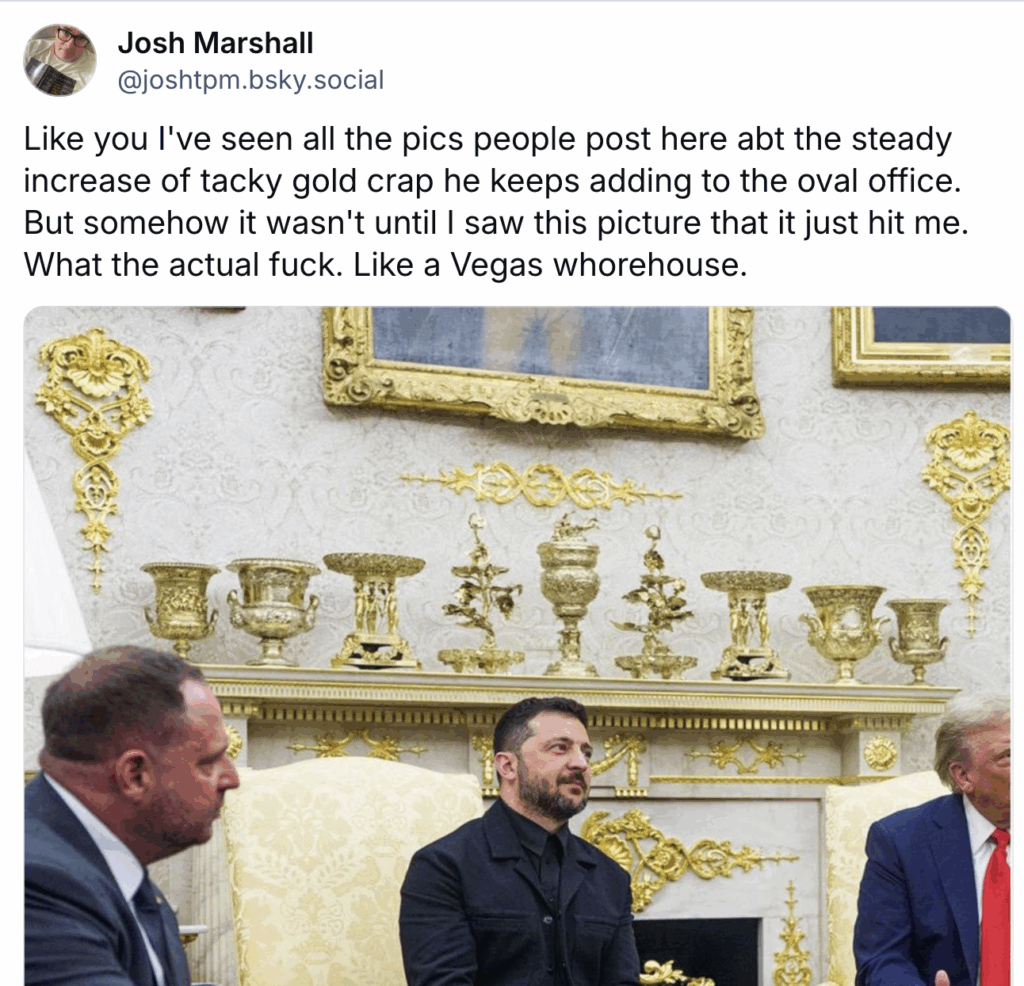Regal, not Republican

Jamelle Bouie observes that while his military occupation of DC, censorship of the Smithsonian, and redecorating the White House like one of his tacky golf clubs are varying degrees of serious in themselves, but they’re all part of a larger anti-democratic ethos: [gift link]
Relative to the worst of the Trump administration — the destruction of the nation’s capacity for scientific and medical research, the indiscriminate arrest of immigrants by roving bands of masked agents and its base-line lawlessness — the president’s move to treat the public property of the United States as part of his personal estate is a minor, almost trivial offense. Who does it hurt, really, if Trump wants to build a second Mar-a-Lago on the Potomac? Is it really an issue if the nation’s museums spend a little less time on slavery — especially if most attendees will learn about it elsewhere? And while the occupation of Washington is far from trivial, it is not hard to find prominent voices who think the president has a point about crime and disorder in the nation’s capital.
This is wrongheaded. Trump’s pretense to ownership of public goods and public spaces isn’t some quirk to be ignored or waited out — “There goes our Donald!” — but a direct expression of his autocratic ambitions and despotic cast of mind. We can almost see him as he sees himself, not as president of a republic — and subject to external constraints — but as an American Bonaparte (albeit more Louis Napoleon than the original) sitting astride the nation itself. Less a caretaker bound to the rhythms of constitutional time than a sovereign ruler of limitless authority.
Or as Trump said during his first term, “I have an Article II where I have the right to do whatever I want as president.”
On Monday, the president held a news conference in the Oval Office while signing a number of executive orders. Flanked by his most loyal subordinates — some of whom took the opportunity to lavish him with obsequious praise — Trump took questions and monologued about the glories of his rule.
“We have tremendous things in every way,” he declared. “It’s hard to believe you can do that when you have a corrupt media. Many of you are corrupt. There’s nothing we can do about it. We keep winning and we are going to keep winning.”
The atmosphere was more regal than republican.
The executive orders themselves were presented as royal decrees. Under one, which purported to announce a new criminal offense, anyone caught burning the stars and stripes would be investigated for a kind of lèse-majesté and sent to prison if guilty. “If you burn a flag, you get one year in jail,” Trump said. “No early exits.” In another decree, the president announced the creation of a so-called rapid response force of National Guard troops, to be deployed wherever he says there is crime or disorder. Trump also mused about the extent of his own power as he mocked opponents of his domestic deployments. “They say we don’t need it — ‘freedom, freedom, he’s a dictator,’” sneered the president. “Maybe we would like a dictator,” he continued. “I don’t want a dictator. I’m a man with great common sense and a smart person.”
It should be obvious that the president doth protest too much. To watch this display, to take in this spectacle, was to see, in perfect limpid clarity, his desires made manifest. He may not want to be a dictator — that may be a little too modern for his tastes — but he clearly wants to be a king. As Trump said the next day during a televised cabinet meeting: “I have the right to do anything I want to do. I’m the president of the United States.”
Peter Morgan wrote a play and movie about David Frost getting Richard Nixon to admit something that Trump routinely says sua sponte. And if 1/6 happened again I don’t think there would be even three Republican senators who would vote to remove him from office.


